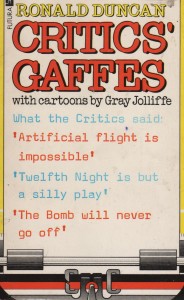Some of the following pronouncements taken from Ronald Duncan’s  hilarious and sometimes shocking anthology, Critics’ Gaffes (1983), come from critics who supposedly know what they’re talking about. Others are the judgements of those who haven’t a clue. Perhaps Geoffrey Grigson nailed it when he described the romantic novelist and radio presenter Melvyn Bragg as ‘a media mediocrity who couldn’t tell good literature from old gym shoes.’ Mind you, like the stopped clock which tells the right time twice a day, a few of the following verdicts have the ring of truth.
hilarious and sometimes shocking anthology, Critics’ Gaffes (1983), come from critics who supposedly know what they’re talking about. Others are the judgements of those who haven’t a clue. Perhaps Geoffrey Grigson nailed it when he described the romantic novelist and radio presenter Melvyn Bragg as ‘a media mediocrity who couldn’t tell good literature from old gym shoes.’ Mind you, like the stopped clock which tells the right time twice a day, a few of the following verdicts have the ring of truth.
Theatre critic Robert Morley on Samuel Beckett’s masterpiece.
‘…it is my considered opinion that the success of Waiting for Godot’ is the end of the theatre as we know it’.
1956
Essayist and critic William Hazlitt on Lord Byron
‘He makes virtue serve as a foil to vices…the noble lord is almost the only writer who has prostituted his talents in this way.’
George Henry Lewis on Charles Dickens
‘Thought is strangely absent from his works. I do not suppose a single thoughtful remark on life or character could be found throughout the twenty volumes.’ (1872)
Aldous Huxley on Dickens
‘Mentally drowned and blinded by the stick overflowings of his heart, Dickens was incapable, when moved, of recasting in terms of art, the reality which had moved him, was even, it would seem, unable to perceive that reality’.
1930
Dr Samuel Johnson on John Donne.
‘The poetry consists of heterogeneous ideas yanked by violence together’
Forgotten expert on Tennyson and Browing, Arthur Waugh, on T.S.Eliot’s ‘Lovesong of J. Alfred Prufrock’
‘ A drunken helot…The reduction to absurdity of literary licence ‘.
Record-breaking hack and alleged poet Clement Wood (see earlier Jot) on Eliot’s ‘The Waste Land’.
‘A farrago of nonsense’
1923
Forgotten critic F. L. Lucas on the same poem
‘Unintelligible, the borrowings cheap and the notes useless’
1923
Lowbrow literary flaneur J.C.Squire on the same poem.
‘A grunt would serve equally well’.
1923
An anonymous American critic on Hardy’s Jude the Obscure
‘When I finished the story I opened the windows and let in the fresh air, and I turned to my bookshelves and said : ‘Thank God for Kipling and Stevenson, Barrie and Mrs Humphry Ward.’
Novelist Israel Zangwill on Ibsen’s ‘The Master Builder’.
‘Rather the Master Bewilderer’.
American humourist H.L.Menken on Henry James
‘…an idiot and a Boston idiot to boot, than which there is nothing lower in the world…’
H.G.Wells on the same novelist.
‘Having first made sure that he has anything left to express, he then sets to work to express it…He spares no resource in the telling of his dead inventions …He brings up every device of language to state and define…His vast paragraphs sweat and struggle …And all for tales of nothingness…It is a magnificent but painful hippopotamus resolved at any cost, even at the cost of its dignity, upon picking up a pea which has got into a corner of its den.’
D.H.Lawrence on James Joyce.
‘My God, what a clumsy olla putridaJames Joyce is! Nothing but old fags and cabbage stumps of quotations from the Bible and the rest, stewed in the juice of deliberate, journalistic dirty-mindedness —what old and hard-working staleness masquerading as the all-new! ‘
Truman Capote on Jack Kerouac.
‘That’s not writing, that’s typing’
Joseph Conrad on D.H. Lawrence.
‘Filth. Nothing but obscenities ‘.
The Times of London on Abraham Lincoln’s Gettysburg Address.
‘ Anything more dull and commonplace it would not be easy to produce’.
Gore Vidal on Norman Mailer’s The Naked and the Dead.
‘It s a fake. A clever, talented, admirably executed fake’.
The Saturday Review on William Morris, The Defence of Guenevere
‘…all that he produces —pictures of queer, quaint knights, very stiff and cumbrous, apparently living all day in chain armour, and crackling about in cloth of gold—women always in miniver, and never in flesh and blood.’
Victoria Sackville-West to Nigel Nicholson on Nabokov’s Lolita.
‘I am afraid that I have been horrified and appalled by the thought that you might publish it…the physical details, both in lascivious description and by implication…are disgusting…As to its literary value…I can see none…how greatly I should deplore your firm publishing this book…it will tarnish the bright name of Weidenfeld and Nicholson.’
December 1958
Cyril Connolly on Ezra Pound
‘I must confess I cannot enjoy Pound’s poetry…(He) seems to be a poet of few natural gifts’.
Kenneth Tynan on Shakespeare’s Hamlet.
‘Hamlet is nothing more than the maudlin introspection of a bourgeois‘
Walter Savage Landor on Shakespeare’s Sonnets.
‘ Not a single one is very admirable…they are hot and pothery: there is much condensation, little delicacy, like a raspberry jam without cream, without crust, without bread, to break its viscidity’
Critic David Holbrook on Dylan Thomas’s Under Milkwood.
‘ …the embodiments have no moral existences and there is no conflict, development, or synthesis: everything is equally of amusing interest, as to a child, and this lack of essential drama makes Under Milk Wood a tedious piece of verbal ‘ ingenuity ‘, redeemed only by its innuendoes and salacious jokes.’
To be continued.
R.M.Healey
